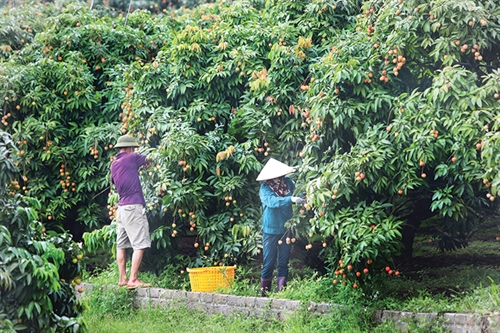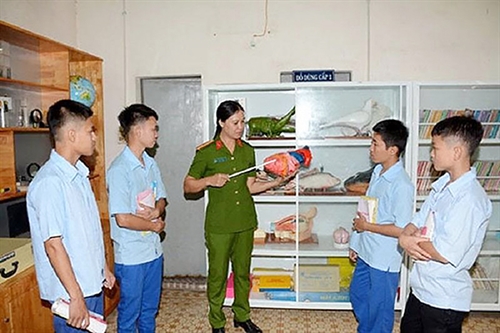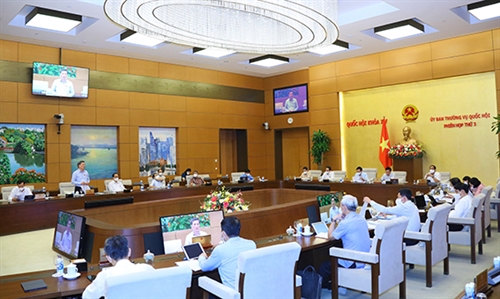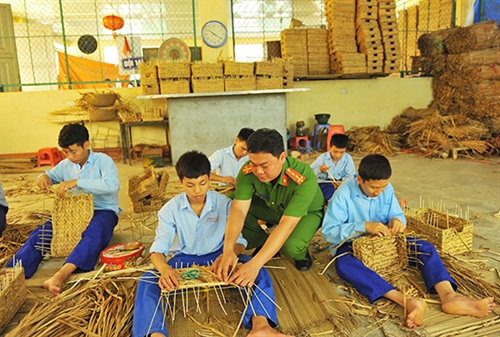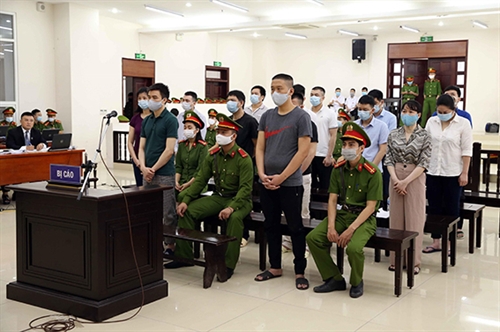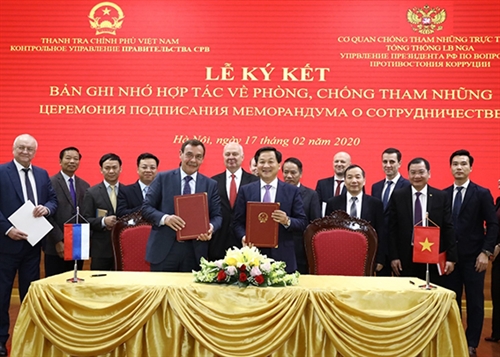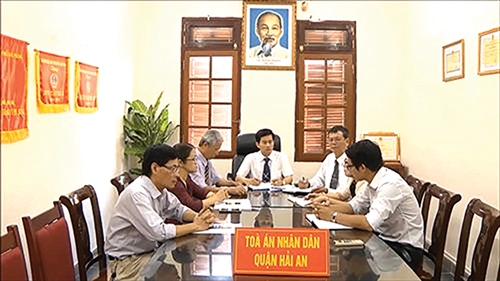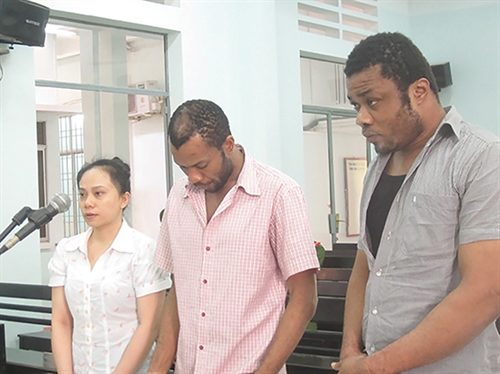Truong Thi Hong Ha, LL.D., and Dinh Kieu Trang, LL.B.
Department of Judicial Reform
Party Central Committee’s Commission for Internal Affairs
Overview
Over the recent years, thanks to the renewal policy as well as the policy of judicial and administrative reform of the Communist Party and the State, Vietnam has obtained enormous achievements in economic development, maintenance of political stability, promotion of foreign relations, and assurance of security and social order and safety. In criminal justice, the Law on Execution of Criminal Judgments was passed in 2019 by the National Assembly[1], significantly contributing to the institutionalization of the Party’s guidelines and the State’s humanitarian policy toward convicts and inmates. Since then, the execution of criminal judgments has recorded notable progresses; security and safety of detention and custody facilities have been better guaranteed; and the correctional education of prisoners has become more effective, thus facilitating the exercise of their human rights. However, there are still many shortcomings, especially in the context that many relevant laws have come into force, such as the 2015 Law on Enforcement of Custody and Temporary Detention, the 2015 Penal Code and the 2015 Criminal Procedure Code, etc. This requires a smooth implementation process to ensure the rights of people serving imprisonment sentences and improvement of regulations on execution of criminal judgments against persons sentenced to life imprisonment in terms of conditions for and accessibility to rehabilitation, and measures to guarantee their rights in line with the humanitarian policy of the Vietnamese State and international human rights standards.
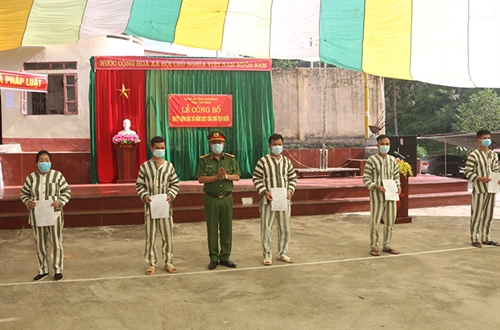 |
| Inmates at a detention camp in Cao Bang province are awarded amnesty decisions in September 2021__Photo: Chu Hieu/VNA |
Domestic regulations on policies on, conditions for, and accessibility to, rehabilitation for persons sentenced to life imprisonment
Firstly, the 2013 Constitution recognizes and guarantees human rights and citizens’ rights, requiring constant renovation and perfection of the legal system, particularly the Penal Code, the Criminal Procedure Code and the Law on Execution of Criminal Judgments as important legal tools for ensuring and protecting human rights and fundamental citizens’ rights for persons sentenced to life imprisonment.
Article 14.2 stipulates: “Human rights and citizens’ rights may not be limited unless prescribed by a law solely in case of necessity for reasons of national defense, national security, social order and safety, social morality and community well-being”.
Secondly, the 2015 Penal Code (revised in 2017) (Penal Code), the 2015 Criminal Procedure Code (Criminal Procedure Code) and the 2019 Law on Execution of Criminal Judgments (Law on Execution of Criminal Judgments) and relevant laws contain many new provisions demonstrating humanism toward people serving life imprisonment sentences.
Article 40.3 of the Penal Code provides that the death sentence shall not be executed when the sentenced person is 75 years of age or older; and the person sentenced to death for embezzlement or taking bribes, after being sentenced, has refunded at least three-quarters of property embezzled or bribes taken, and closely cooperated with law enforcement bodies in the process of investigation or trial, or has made merits in an effort to atone for the crime. This provision opens a way to life for offenders sentenced to death, and at the same time defines the responsibility of life-imprisonment inmates for fighting corruption so that they can become useful citizens.
The Penal Code also contains many new provisions on commutation of declared sentences for an offender convicted of multiple crimes with one of his/her sentences being life imprisonment. It provides that the sentence-serving period to be considered for the first commutation for a convicted who is entitled to reduction of part of his/her penalties but commits a new crime during such period must be based on seriousness of his/her new criminal act. The Code also contains a new provision on consideration of sentence commutation for an offender sentenced to death and eligible for amnesty or exemption from sentence execution. The first commutation may only be given after the convict has served his/her sentence for at least 25 years. For enjoying commutation for several times, he/she must have actually served his/her sentence for at least 30 years in total.
One of the Code’s totally new provisions, which is on conditional parole, stipulates that inmates who have served their sentences for a certain period of time and satisfy specified requirements may be considered for a community sentence but must perform certain obligations during the probation period[2]. Article 66 provides that a person serving an imprisonment sentence (inmate) may be granted parole when satisfying all of the following conditions: (i) he does not have a previous criminal record; (ii) he shows remarkable improvements; (iii) he has a fixed place of residence; (iv) he has served additional penalties being fines and compensation for damage and paid legal costs; and (v) he has served at least 15 years of his life imprisonment sentence commuted to termed imprisonment. An inmate who is an invalid, sick soldier, member of a martyr’s family or aged 70 or older, or suffers from a serious physical disability or extremely serious physical disability, or a woman currently raising a child under 36 months of age is required to serve at least 12 years of a life imprisonment sentence commuted to termed imprisonment in order to be considered for parole.
The Code also has a new provision on violations against regulations on detention[3] in order to ensure security and safety for detention facilities, contributing to creating a healthy environment for inmates.
The Law on Execution of Criminal Judgments has many new provisions on implementation of policies toward inmates in a more humane manner, best guaranteeing the rights of inmates in the course of serving their sentences (there is no distinction between life imprisonment and termed imprisonment inmates) in the protection of life, health and property, and respect for honor and dignity[4]. The Law also features specific provisions on those to be detained separately, classification of inmates serving imprisonment sentences, inmates who have their sentences temporarily suspended for being seriously ill or showing signs of mental illness that needs a medical assessment, re-integration of released inmates into the community, and inmates receiving money by post[5].
The Law also adds one section of 16 articles on conditional parole[6]. It obligates inmates to abide by legally effective court judgments and rulings and decisions of criminal judgment execution management agencies and criminal judgment enforcement agencies in the course of execution of criminal judgments, and other decisions of competent state agencies; and observe rules of detention facilities; follow requests, orders and instructions of officers of detention facilities; and work and learn an occupation regulations. Inmates who damage, cause loss of or destroy other inmates’ assets have to make compensation.
The 2014 Law on Organization of People’s Courts and the 2014 Law on Organization of the People’s Procuracies also have provisions concerning the execution of criminal judgments in order to observe the principle: “Court judgments and rulings that have become legally effective shall be executed and respected by agencies, organizations and citizens. Individuals, agencies and organizations concerned, within the ambit of their responsibilities, shall strictly abide by court judgments and rulings and take responsibility before law for their abidance. State agencies, commune, ward and township administrations and citizens shall coordinate with agencies and organizations tasked with executing court judgments and rulings in executing court judgments and rulings”. Accordingly, for inmates sentenced to life imprisonment, courts have the jurisdiction to issue judgment execution decisions, decisions entrusted execution of criminal judgments or decisions on postponement or suspension of the execution of imprisonment sentences; prepare dossiers requesting amnesty (for special subjects) and assist the Amnesty Advisory Council in implementing the amnesty, and consider and decide on conditional parole.
Meanwhile, the Law on Organization of People’s Procuracies provides the functions of procuracies to supervise the execution of imprisonment sentences, manage and educate persons serving imprisonment sentences in accordance with law, and ensures that human rights and other legitimate rights and interests of inmates that are not restricted by law must be respected and protected.
The 2016 Law on Beliefs and Religions recognizes inmates’ freedom of belief and religion, thereby ensuring that life imprisonment inmates have the right to use scriptures and express their faiths.
Thirdly, life imprisonment inmates constitute one of the subjects governed by the Law on Amnesty[7], which institutionalizes a major policy of the Party and the State, demonstrating the guarantee and promotion of human rights in Vietnam, and leniency and humanism toward inmates who have shown improvements in the rehabilitating process to as to help them reintegrate into the community as law-abiding and useful citizens.
Article 3.1 of the Law on Amnesty stipulates: “Amnesty is a special clemency of the State through the President’s decisions to grant parole to those sentenced to termed imprisonment or life imprisonment on the occasion of great national events and anniversaries or in special cases.” In special cases, the President shall consider and decide on special amnesty regardless of these occasions in order to meet requirements of internal or external relations.
In order to be proposed for being granted special amnesty, a life imprisonment inmate must have served his life imprisonment sentence which has been commuted to termed imprisonment and fully satisfy the conditions specified in Article 11 of the Law on Amnesty, such as having made great improvements, showing a good sense of rehabilitation and being classified into “fairly good” or “good” inmate groups in serving their imprisonment sentences in accordance with the Law on Execution of Criminal Judgments.
An inmate whose life imprisonment sentence commuted to termed imprisonment must have served his imprisonment sentence for at least 14 years or 17 years (depending on severity of his crime). In order to be granted amnesty by the State President, persons sentenced to imprisonment for corruption or other related crimes must have completely served their additional penalties including payment of fines, compensations for damage and legal costs, return of assets appropriated through the commission of crimes, and performance of other civil obligations. Only in case they are in particularly difficult financial conditions or civil obligations-related property are not owned by the State and judgment creditors agree with postponement of judgment execution or do not request judgment execution, can inmates be exempted from serving such additional penalties in order to be proposed for amnesty. Once granted amnesty, they may not do anything affecting social security and order.
Under this Law, persons sentenced to imprisonment for the following 16 crimes are ineligible for amnesty even though they fully satisfy the aforesaid conditions: high treason; carrying out activities aimed at overthrowing the people’s administration; espionage; infringing upon territorial security; rebellion; terrorism aiming to oppose the people’s administration; sabotaging physical-technical foundations of the State of Vietnam; producing, storing, spreading or disseminating information, documents or objects aiming to oppose the State of Vietnam; disrupting security; destroying detention facilities; terrorism; undermining peace, waging war; crime against humanity; war criminal; recruiting, training or using mercenaries; and being a mercenary. Compared to the 2007 Law on Amnesty under which all inmates who are lodging appeals according to cassation or reopening procedures are ineligible for amnesty, Article 12.2 of the 2018 Law on Amnesty narrows the span of inmates ineligible for amnesty: Only inmates against whom court judgments or rulings are wholly or partially appealed toward aggravating their criminal liability are not proposed for amnesty.
Practical implementation of regulations on policies and conditions on, and accessibility to rehabilitation, for life imprisonment inmates in Vietnam
Advantages
Firstly, the detention of life imprisonment inmates complies with the 2019 Law on Execution of Criminal Judgments (the Law) regarding procedures for and time of sending convicts sentenced to life imprisonment to serve their sentences and public notification of facilities admitting them.
The proper implementation of the Law’s relevant provisions has helped basically address the situation of prolonging periods of detention of convicts sentenced to life imprisonment whose sentences have become legally effective in detention camps. At the same time, the admission of life imprisonment inmates has been strictly carried out, ensuring admission of right prisoners with complete files and observance of regulations on sending of notices to courts that have issued judgment execution decisions, inmates’ families and diplomatic missions (for foreign convicts) and notification to civil judgment execution offices of additional penalties being fines or civil compensations so that such offices, organizations and families can know where the inmates are to serve their sentences as well as bodies responsible for incarcerating, educating and rehabilitating them.
Secondly, the classification and incarceration of life imprisonment inmates are specified and organized routinely to ensure strict discipline and create a safe and healthy educational environment for life imprisonment inmates’ sentence serving.
The Ministry of Public Security’s Circular 17/2020/TT-BCA dated February 18, 2020, providing internal regulations of inmate detention facilities, has provided a legal ground for life imprisonment inmates to exercise their basic rights, and at the same time specified acts prohibited in prisons and detention facilities. This Circular also provides family visits and consular contacts, and specifies people who come to work or coordinate with detention facilities in organizing educational activities therein. Over the recent years, it has helped gradually reduce activities that disrupt order and oppose law enforcement officers in prisons and detention facilities. Therefore, the number of absconding practices, collective disturbance or opposition have also been reduced while almost all inmates violating detention facility rules and regulations have been detected in time. Life imprisonment inmates are entitled to regular family visits, gifts and letters, and to make phone calls to their families just like termed imprisonment inmates. They are also allowed to carry out production activities to improve their livelihood, buy essential goods on depository book entries at publicly posted prices to additionally meet their daily-life needs. Every year, prisons and detention facilities hold inmates’ family conferences to announce results of inmate rehabilitation and discuss measures for coordinated education and reform of inmates.
Thirdly, policies on entitlements to food portion, clothing, learning, medical treatment, education, rehabilitation, vocational education and training activities for inmates have also seen numerous positive changes and been strictly implemented under relevant regulations[1], showing the Vietnamese State’s humanitarian policy toward, and creating a favorable environment for, life imprisonment inmates to study, work and reform themselves.
In order to improve the material and spiritual lives of inmates, the Ministry of Public Security has recently enacted prison and detention facility rules and the regulation on democracy in prisons and detention facilities, provided for conciliation activities and formation of inmate self-management boards. It has set out four standards of emulation among inmates serving imprisonment sentences and regulations on grading of the emulation’s results for imprisoned inmates. It has also coordinated with the Ministry of Justice, Ministry of Education and Training, Ministry of Labor, Invalids and Social Affairs, public communication and education agencies, the Vietnam Women’s Union, Vietnam Youth Federation, Vietnam Lawyers’ Association and other related agencies and organizations in conducting scientific research in education and promulgating joint circulars guiding legal and civic education, knowledge dissemination and provision of vocational training to inmates, and carrying out many activities to popularize laws and the Party’s and the State’s guidelines and policies among inmates, coordinated education of female and adult inmates, helping them reintegrate into the community, and organization of classes for illiterate inmates. In practice, a number of prisons and detention facilities have opened Vietnamese language classes for foreign inmates to serve the management and education of them while they are serving their sentences. More attention has been paid to providing vocational training courses and granting trainee certificates to inmates order to create opportunities for them to seek employment and stabilize their livelihood once released[2];
Life imprisonment inmates who have many previous convictions and frequently violate the rules and are therefore classified as “bad” have always received special attention and conditions for transforming themselves into better persons, thus reducing their negative practices and violations. For this purpose, prisons and detention facilities have regularly organized complementary education activities and launched movements of emulation among inmates for properly serving their prison sentences, as well as artistic, physical training and sports activities to meet their spiritual, cultural and information needs. As a result, the number of inmates with poor performance dropped to 5.54 percent in 2018 from 9.51 percent in 2011, and the number of inmates who have their imprisonment sentences reduced or suspended or are granted amnesty is on the rise[3].
Disease prevention and control for inmates have been properly organized while all prisons and detention facilities have built their clean water supply systems. Inmates in bad health conditions have been treated in infirmaries or hospitals (or clinics in local hospitals)[4].
Fourthly, the imprisonment sentence execution apparatus has been consolidated in the direction of streamlining the staff size and improving the quality and qualifications of correctional officers and soldiers. Physical foundations of prisons and detention facilities have been built with sufficient equipment up to relevant standards so as to meet requirements of the international integration process. Over recent years, all prisons and detention facilities have been upgraded to ensure minimum detention conditions in accordance with the Law (for example, the minimum incarceration area of 2.2 square meters per inmate).
In implementing the Law and Government Decree 01/2018/ND-CP dated August 6, 2018, the criminal judgment execution organization system has been scientifically organized. At the ministerial level, the criminal judgment execution management agency of the Ministry of Public Security was established to assist the Minister of Public Security in performing his tasks and exercising his powers provided in the Law. At the provincial level and district level, criminal judgment execution agencies of provincial-level and district-level Public Security Departments/Offices were established. At the commune level, commune-level People’s Committees were assigned to perform a number of criminal judgment execution tasks[5].
The inspection and examination of prisons and detention facilities have been carried out regularly to promptly detect and handle violations and propose competent authorities to amend and supplement regulations on criminal judgment execution. In addition, attention has been paid to the settlement of complaints and denunciations of life imprisonment inmates according to the competence and procedures and within the time limit provided in the Law on Complaints, the Law on Denunciations, and the Law.
Fifthly, community reintegration for life imprisonment prisoners upon their release has received due attention from the community.
Many agencies, departments, mass organizations and people have actively participated in the management and education of inmates who have completed serving their imprisonment sentences, helping them get lawful employment and have a stable livelihood[6].
In sum, over the recent years, the regulations on policies and conditions on, and accessibility to, rehabilitation for life imprisonment inmates in Vietnam have seen positive changes and improvements toward better guaranteeing their lawful rights and interests. Attention has been paid to education, correction and conversion of these inmates into useful citizens and provision of assistance for their community reintegration; entitlements and policies for them have been guaranteed while prisons and detention facilities improved. Correctional officers have been provided with professional training to ensure regularity and professionalism. These outstanding results are attributable to assurance of strict observance of law; respect for, protection and assurance of human rights; and firm maintenance of political stability, social order and safety.
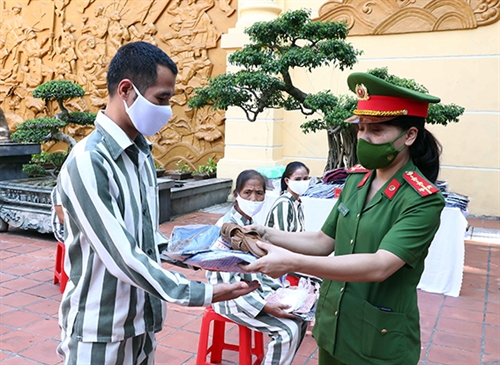 |
| Returning personal belongings to prisoners at Phu Son 4 detention camp in Thai Nguyen province, who are released under amnesty decisions__Photo: Pham Kien/VNA |
Difficulties and obstacles
Firstly, not a few regulations concerning incarceration of imprisoned inmates remain inconsistent or unspecific, leading to a perplexed application process.
Many prisons and detention facilities found themselves perplexed in incarcerating transgender inmates and determining gender of those with ambiguous gender identity, dealing with inmates eligible for sentence serving suspension and handing over those having their sentences temporarily suspended due to serious illness for treatment at hospitals to administrations of communes, wards or townships where they reside, guaranteeing the right to use scriptures, express their beliefs or religious faiths, including also newly emerging religions, the right to marriage between life imprisonment inmates and convicts sentenced to death, and the right to donate body parts, donate or deposit sperms in sperm banks, etc.
Secondly, community reintegration of former inmates has not been paid adequate attention by not a few localities, especially in arranging accommodations for former inmates to stabilize their life, employment and participation in social affairs, etc.
Thirdly, amnesty work has not been performed regularly. Despite the large number of inmates granted amnesty, there are no binding regulations on strict conditions that must be satisfied by former life imprisonment inmates upon their community reintegration, especially when compared with those released on conditional parole.
Fourthly, regarding the incarceration management, inspection and control of prisons and detention cells have been loosened here and there, leading to such phenomena as jailbreak and commission of new crimes behind bars, particularly incidents and injuries intentionally caused by inmate fighting, have still occurred; illegal concealment and use of communication devices, drugs and prohibited objects also remain complicated.
Fifthly, quality of inmate education and correction remains low due to inappropriate education methods.
Sixthly, number and quality of physical foundations and detention cells in prisons and detention facilities remain low; supporting tools and equipment for use in service of incarceration remain insufficient; and there are still shortcomings in the planning, designing and construction of detention cells and facilities.
Seventhly, professional qualifications and legal knowledge of wardens and correctional officers are not up to requirements.
Reasons
Firstly, as objective reasons, the large number of convicts serving life imprisonment sentences and dangerous nature of particularly serious crimes have put great pressure on inmate management, incarceration and rehabilitation work while there is still a lack of regulations specifying measures to deter inmates who frequently show their villainousness, danger and opposition.
Secondly, the need for assurance of the rights of life imprisonment inmates is always on the rise while relevant specific regulations remain inadequate.
Thirdly, for the reason that the time spent behind bars is too long during which there arise many changes in their families, it is understandable that life imprisonment inmates are psychologically unstable and feel insecure about their families and relatives, thus affecting their rehabilitation process.
Fourthly, the coordination between relevant bodies has not been consistent and synchronous enough in the process of receiving released inmates for integration into the local community; and local authorities have not properly identified their responsibility, showing lack of activeness and a psychology of depending on public security forces, for receiving former inmates and facilitating their community integration.
Fifthly, prisons and detention facilities remain perplexed in dealing with life imprisonment inmates who are suffering from HIV/AIDS and other dangerous diseases.
Sixthly, the strict observance of rules of prisons and detention facilities has not yet received proper attention of leading officers, and not a few units and officers on duty have failed to perform their tasks promptly and consistently and to propose appropriate forms and methods to ensure strict implementation of such rules.
If these problems remain unaddressed in the near future, they might become risks directly affecting the prison and detention facility security as well as management and education of inmates to become useful citizens for society upon their community reintegration and the state management of the execution of imprisonment sentences.
Some recommendations on solutions to guarantee rights of life imprisonment inmates in Vietnam
Improving awareness about and renewing the dissemination of regulations on human rights of life imprisonment inmates
In order to realize the humanitarian policy of the Party and the State toward life imprisonment inmates while serving their sentences, it is necessary to renew the forms of law dissemination and education, intensify the application of information technology, and target the dissemination and education of the humanitarian criminal justice’s regulations to inmates and their families and the entire society. Only by this way will inmates voluntarily reform themselves, receive medical treatment, learn new occupations and find opportunities to integrate themselves into the community, thus gaining sympathy from their families and society. Renewing the way of thinking and eliminating prejudices and discrimination against life imprisonment inmates are also needed.
Building and perfecting legal documents governing relevant issues
So far, the Law on Execution of Criminal Judgments and the Law on Amnesty have taken effect and proven effective in reality. However, in the coming time, legal documents detailing and guiding the implementation of the Law on Execution of Criminal Judgments should be issued with necessary revisions to suit special characteristics of life imprisonment inmates and consider translating relevant provisions of multilateral treaties and agreements concerning criminal private laws to which Vietnam is a contracting party into domestic regulations suitable to practical national development. Laws on extradition and handover of inmates serving imprisonment sentences should be built to ensure uniformity, consistency and feasibility of the laws on judgment execution, thus guaranteeing rights of life imprisonment inmates.
Revising policies and conditions on, and improving accessibility to, rehabilitation for life imprisonment inmates
Contents, programs and methods of education and vocational training for inmates should be renewed to become more practical and effective order to reform inmates into useful citizens and prevent them from relapsing into crime commission once they are granted amnesty or released on conditional parole. Vocational training for life imprisonment inmates should be provided in a fashion that can ensure that they can practice trained jobs during the rehabilitation process in prisons or detention facilities and also in localities where they return to live upon their community reintegration. Prisons and detention facilities should coordinate with businesses in providing vocational education and training to inmates and employing them when they are released.
Enhancing supervision during period of incarceration
Supervision, regular inspection and prompt detection of violations in the process of incarceration and rehabilitation of inmates should be further enhanced. entitlements, policies, living and working conditions, vocational training, medical examination and treatment for life imprisonment inmates should be guaranteed. Loopholes, shortcomings and violations in the management, education and rehabilitation of inmates should be promptly addressed and strictly handled.
Connecting life imprisonment inmates with society
The role of local authorities and socio-political organizations should be promoted to facilitate economic development and pay greater attention to families and relatives of life imprisonment inmates so that they can recognize that the Party and the State do not leave them behind. In addition to fully guaranteeing lawful rights and interests of life imprisonment inmates, the State should ensure wellness of their families so that they can feel secure in studying and reforming themselves.
Prisons and detention facilities should create conditions for life imprisonment inmates to update information about their localities, the country and the world. Well-reformed inmates should be rewarded with more family visits.
Intensifying international cooperation in the execution of criminal judgments
More attention should be paid to negotiation and conclusion of agreements on handover of imprisonment inmates with countries being strategic partners or comprehensive cooperation partners or having traditional relationships with Vietnam. Research and sharing of experience with countries in the region and the world in the execution of life imprisonment sentences should be intensified in order to ensure consistency of Vietnamese laws with those countries’ laws.
Provision of information and public communication about the practical implementation of humanitarian and merciful policies of the State and the Party on execution of criminal judgments toward life imprisonment inmates should also be intensified in order to raise the public awareness about Vietnam’s efforts to guarantee and protect human rights of inmates. Handover of imprisonment inmates should be carried out under relevant treaties or international agreements to which Vietnam is a contracting party on the principle of reciprocity, ensuring fruitful external relations and conformity with Vietnamese laws and international practice.-
[1] Government Decree 133/2020/ND-CP dated November 9, 2020, detailing the implementation of a number of articles of the Law on Execution of Criminal Judgments.[2] As of 2018, 46 out of 54 prisons and detention facilities had established vocational training centers for inmates, focusing on such occupations as tailoring, construction, carpentry, mechanical engineering, embroidery making, cultivation, animal husbandry, and agricultural product processing.[3] From 2011 to May 2018, there were three drives of amnesty and parole for 44,397 inmates. In 2021, 3,026 imprisonment inmates, three whose prison sentences are suspended, and six whose sentence serving is postponed were considered eligible for amnesty.[4] Fifty out of 54 prisons and detention facilities have built separate treatment rooms for inmates at district-level health centers and provincial-level hospitals.[5] At present, the criminal judgment execution system is stably organized with 54 prisons and detention facilities directly managed by Police Department for Management of Prisons, Compulsory Education Institutions and Reformatories of the Ministry of Public Security, 63 criminal judgment execution agencies of provincial-level Public Security Departments, and 703 criminal judgment execution agencies of district-level Public Security Offices.[6] For example, the Ho Chi Minh City Fund for Reformed Inmates, the Entrepreneurs with Security and Order Fund in Thanh Hoa and Dong Nai provinces, and many similar models of assistance for released inmates’ community reintegration in Da Nang city and Bac Ninh and Nam Dinh provinces have been founded.
[1] This Law replaces the 2010 Law on Execution of Criminal Judgments.[2] Under Articles 66 and 106 of the Penal Code for under-18 inmates, the probation period is exactly equal to the period of serving the remaining imprisonment sentence. If, during the probation period, the parolee intentionally violates his obligations twice or more and is fined for administrative violations twice or more, the court may issue a ruling forcing the parolee to return to prison to execute the remainder of his prison sentence.[3] Article 388 of the Penal Code.[4] Article 27 of the Law on Execution of Criminal Judgments.[5] Articles 30, 35, 37, 45 and 52 of the Law on Execution of Criminal Judgments.[6] Section 3, Chapter III of the Law on Execution of Criminal Judgments (Articles 57 thru 72).[7] Amnesty is one of the legal institutions specified in Articles 88 and 91 of the 2013 Constitution, and institutionalized by the 2018 Law on Amnesty and other relevant legal documents.
